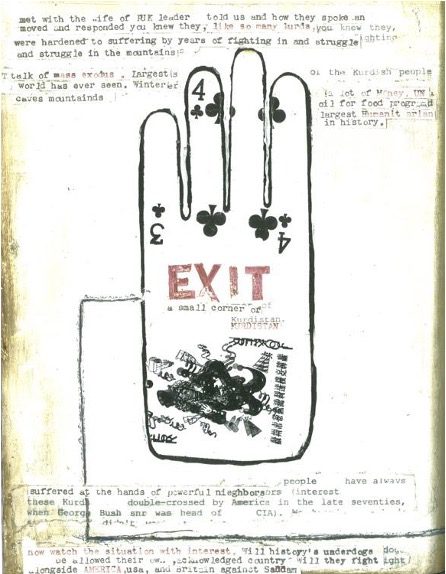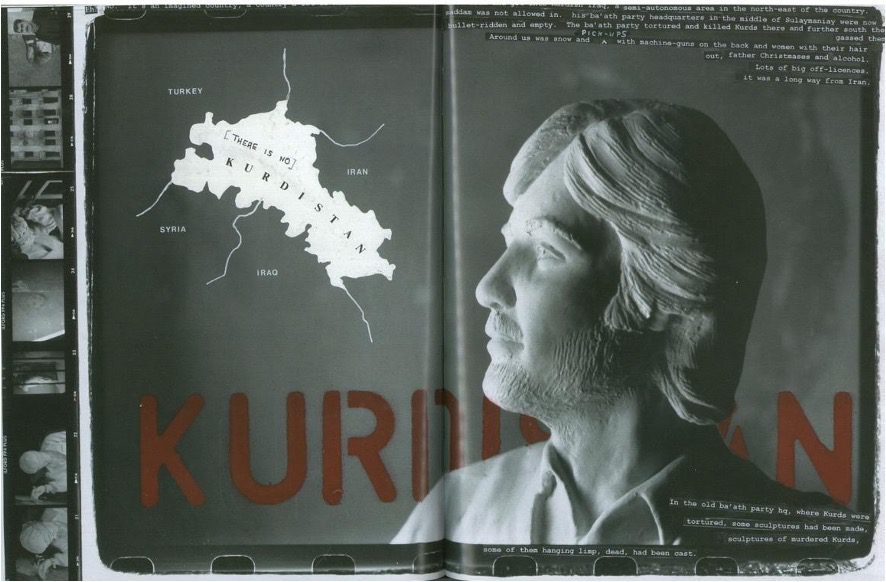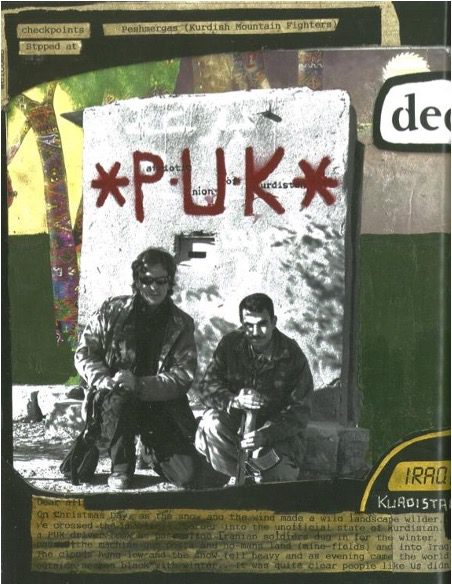Our recent library volunteer Yasmine Mattoussi reviews INDEX Exhibition Workshop ‘Sharing memories over Kurdish cuisine’ as part of exhibition “Untitled, an exhibition of works in progress by Maria Amidu.”

Image from Off screen : four young artists in the Middle East : Al Braithwaite, Henry Hemming, Stephen Stapleton, Georgie Weedon.
A table of guests sat around an abundant spread of Kurdish dishes provided in part by Nandine, a Kurdish restaurant in Camberwell and carefully laid out by artist and facilitator Êvar Hussayni. The evening was going to be centred around the connections between food and memory, and guests were given small notepads to write down their feelings and thoughts at intervals throughout the shared meal. What unfolded over the next few hours was a beautiful exchange of anecdotes, nostalgia, and laughter, as people resonated with each other’s stories and exchanged family lore. A familial feeling encapsulated the event, making a room full of strangers feel like they had known each other for years.
For Êvar, the event was a refreshing change of narrative, as she said, “From a facilitator’s perspective, it can be nerve-wracking to organise—events like this are always a bit political.” The food was a carefully-chosen centrepiece for its communal aspects, and it successfully united participants from an array of backgrounds. Over glasses of pomegranate juice and plates of borek and kibbeh (savoury pastries), they laughed about their parents’ airport security woes and Sunday market bargaining tactics.
Part of being an artist is having to revisit the harder aspects of the work to ensure that people understand the full scope of its intention. Êvar said that:
“I think for me it’s like, will people know what I’m talking about when I say Kurds? It can be exhausting to repeat and regurgitate the entire history.”
For the Kurdish context, stepping away from Kurds being political bodies, focusing on just the everyday, according to Êvar is considered resistance. Often, conversations about Kurds revolve around war and violence, and Êvar wanted to redirect that narrative towards existing as an act of resistance, as I remember she said:

Image from Off screen : four young artists in the Middle East : Al Braithwaite, Henry Hemming, Stephen Stapleton, Georgie Weedon.
“Resisting is always about resisting death… how else can resistance look? It can be the complete opposite of death, it can be living, existence.”
The workshop was delivered as part of the public programme for Maria Amidu’s exhibition, which employs themes of correspondence and communication with seemingly mundane materials. Amidu’s work was showcased and discussed during the event to invoke memories associated with sharing food and communicating over a dinner table.
In her essay “Who Will We Be When We Are Free?” Sophia Azeb addresses the feeling of creating a community through exile and fragmented histories:
“How might we embrace our own invention, from the catastrophe, in order to craft our futures? Our exile reveals where we are absent, but we have always been able to see one another and our relations. We must also know one another as layered and contradictory. Our future selves are always in the making. We make space for new reflections every day. Our futures are in us. We are our own futures”.

Image from Off screen : four young artists in the Middle East : Al Braithwaite, Henry Hemming, Stephen Stapleton, Georgie Weedon.
Conversations around the meal revealed a variety of contradictions and layers among participants, yet the overarching feeling was that the people whose aim it was to communicate these contradictions, achieved harmony.
For me, the event made me feel nostalgic for childhood family dinners, with uncles and aunts I did not see often. I wrote in my notepad about memories of sitting on the floor of my grandmother’s house, around chorba and a colossal bowl of Tunisian couscous. My family laughed, argued, and reminisced in the hot summer air. In a much cooler London, a similar feeling accompanied the scene. As each dish was consumed, it was compared with someone’s own regional delicacy for its similarity, and guests were able to connect over family recipes. A new community was built in one evening, in one room, between a group of people who may have otherwise never have met.
People enjoying each other’s company for a few hours and leaving the event well-fed with dishes they had learned about opening up new forms of memory. This event solidified a memory in my own existence, while invoking old ones I had not thought about for years.
Biography
Yasmine Mattoussi is a graduate student in Migration and Diaspora Studies at SOAS. She has been a volunteer at the Stuart Hall Library since March 2023. Her research interests are in North African and West Asian diasporas, as well as archives of modern Arab art and media.
Resources
To read more about Kurdistan and Kurdish artists look into these selections available at Stuart Hall Library:
- Kurdish culture and identity / edited by Philip G. Kreyenbroek, Christine Allison.
- Digging upwards : the works of Hiwa K, which feature in this year’s documenta 14, draw on the misconceptions that pervade Western views of recent Middle Eastern history/ by Ben Fergusson.
- Off screen : four young artists in the Middle East : Al Braithwaite, Henry Hemming, Stephen Stapleton, Georgie Weedon.
- Susan Meiselas: Kurdistan – in the shadow of history / Amanda Hopkinson.
- Kurds don’t steal / by Larena Amin.
Images from Off screen : four young artists in the Middle East : Al Braithwaite, Henry Hemming, Stephen Stapleton, Georgie Weedon.